Blockchain Compliance Careers (2026): Skills, Roles, Salaries & How to Enter the Field
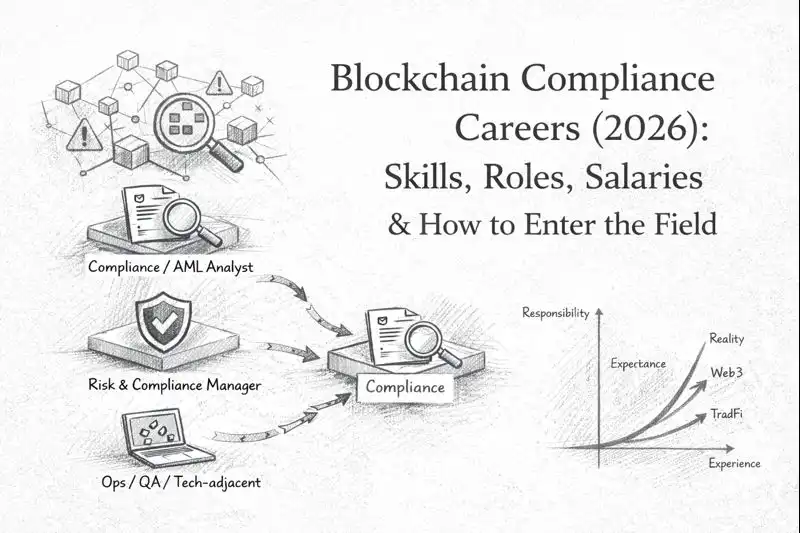
Why Blockchain Compliance Careers Exist
Blockchain compliance careers didn’t emerge because regulators suddenly “understood crypto.”
They emerged because crypto broke traditional compliance models.
Exchanges collapsed. Protocols were exploited. Funds moved faster than regulators could trace. Governments reacted late — and when they did, they reacted hard. The result wasn’t the death of Web3. It was the rise of compliance, risk, and regulatory roles inside blockchain companies.
Today, every serious blockchain business — exchanges, custodians, infra providers, stablecoin issuers, fintechs — runs on compliance. Not as a checkbox, but as a survival layer.
This is why blockchain compliance careers are one of the few Web3 roles that grow even during hiring slowdowns.
Yet most people still misunderstand this career path. Some think it’s purely legal. Others assume it’s only for lawyers or ex-bankers. Many don’t know where to start, what skills matter, or how hiring actually works.
Related discussion on career switching into Web3:
https://artofblockchain.club/discussion/should-i-switch-to-blockchain-career
This guide fixes that.
Over the past year, this question has only become more confusing. Candidates who would have been hired in 2024 are now being rejected for reasons that aren’t obvious from job descriptions alone — especially in compliance and risk roles where expectations quietly shifted after multiple regulatory actions.
Many of these questions surface repeatedly from professionals evaluating whether switching to a blockchain career makes sense, especially when they want exposure to Web3 without becoming developers.
This article focuses on how blockchain compliance roles work in practice, not theory.
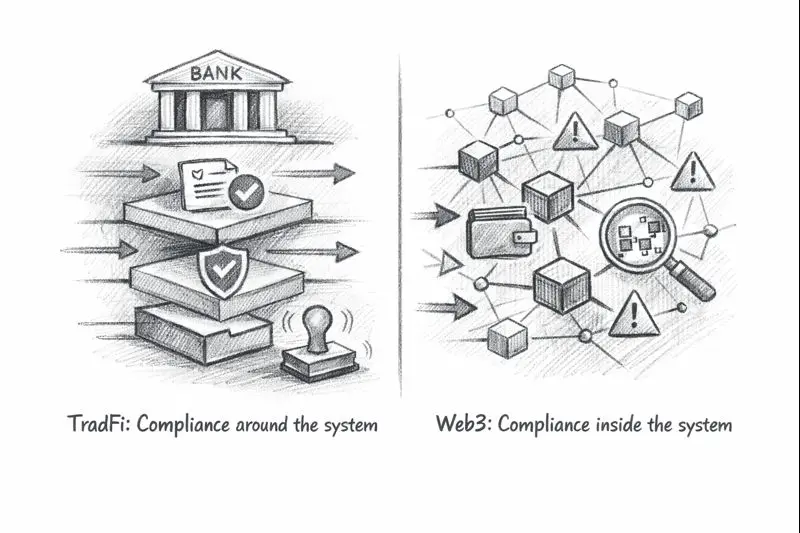
TL;DR
Blockchain compliance is a real and growing career path
Hiring continues even during market downturns
You don’t need to be a developer, but you must understand on-chain behavior
Tools and judgment matter more than certificates
Salaries are competitive for experienced profiles
Entry is possible — but not effortless
If you’re reading this while questioning whether you’re already “late” to Web3, that concern is common. Many professionals entering blockchain compliance today are not early adopters — they are responding to how the industry has matured, not how it started.
Why Compliance Became a Core Web3 Career
In traditional finance, compliance sits around the system.
In blockchain, compliance sits inside the system.
Transactions are irreversible. Assets are borderless. Identities are pseudonymous. Code executes faster than law. This forces companies to hire people who can interpret regulations and understand how blockchain systems behave under stress.
This is why compliance roles in Web3 are not clerical or junior-heavy. Even early-career hires are expected to make judgment calls.
What surprises many candidates is that this shift happened quietly. There was no announcement, no clear hiring reset — just a gradual tightening of expectations that most people only discover after failed interviews.
Reference: FATF guidance on virtual assets
https://www.fatf-gafi.org/en/topics/virtual-assets.html
Who Blockchain Compliance Is Actually For
Blockchain compliance roles are best suited for professionals with backgrounds in:
AML / KYC
Financial crime
Risk management
Audit or regulatory reporting
Payments or fintech operations
Trust & safety or investigations
These roles are part of a broader category of non-developer Web3 roles that still require deep system understanding without writing production code.
Developers can move into compliance, but most compliance hires come from non-engineering backgrounds who understand how blockchain behaves rather than how to build it.
That distinction matters.
In practice, this is where many applicants misjudge themselves. They assume adjacent experience will automatically transfer, only to realize late in the process that on-chain context is treated as a baseline, not a bonus.

Blockchain Compliance Roles, Skills & Tools
Most people assume “compliance” is one job. It isn’t.
Blockchain compliance is a function composed of multiple roles, each sitting at a different intersection of regulation, risk, and on-chain activity.
Core Blockchain Compliance Roles
1. Blockchain Compliance / AML Analyst
This is the most common entry role — and it’s not junior in the traditional sense.
Compliance analysts monitor on-chain activity, investigate suspicious behavior, document findings, and escalate risks. Unlike traditional finance, this work happens on-chain, not just inside internal databases.
What hiring managers evaluate here is judgment — not rule memorization.
Candidates often underestimate how much independent decision-making this role involves. In smaller teams, there is rarely a senior layer validating every judgment call — which is why hiring managers probe reasoning more than rule recall.
Reference: FATF Travel Rule overview
https://www.fatf-gafi.org/en/topics/virtual-assets/travel-rule.html
2. Risk & Compliance Manager
As companies scale, compliance shifts from monitoring to risk ownership.
Managers design frameworks, define thresholds, coordinate audits, and work with regulators. They must understand both the business model and regulatory exposure.
3. Head of Compliance / CCO
At senior levels, compliance becomes strategic.
These leaders manage regulatory posture across jurisdictions, licensing strategy, crisis response, and investor confidence. Many CCOs come from fintech or banking, not crypto-native backgrounds.
4. Compliance vs Legal vs Risk
A common confusion:
Legal interprets law
Compliance operationalizes law
Risk decides acceptable exposure
In Web3, compliance often overlaps with crypto risk analyst roles, especially when on-chain exposure, sanctions, or liquidity risks are involved.
Understanding this distinction helps candidates apply for the right roles.
This distinction becomes painfully clear during interviews, where candidates answer legal questions well but struggle when asked what they would actually do in a live on-chain incident.
Related discussion on risk vs compliance roles in crypto teams:
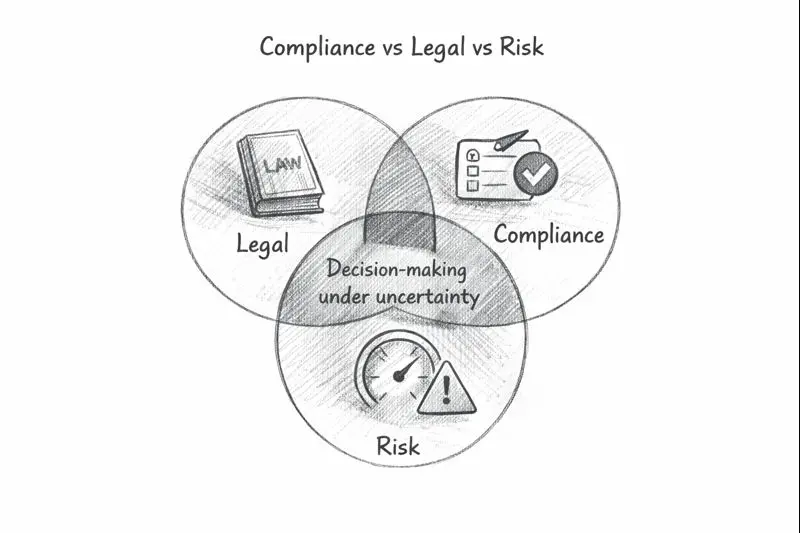
Skills That Actually Get Hired
Hiring managers prioritize:
AML / KYC fundamentals
Risk-based reasoning
Clear written documentation
Understanding of on-chain behavior
Communication across teams
They evaluate candidates based on hiring signals Web3 teams actually assess — not certificates alone.
This is also why some highly credentialed candidates struggle. On paper, they look strong — but when faced with incomplete data or ambiguous signals, their answers reveal hesitation rather than judgment.
Related discussion on certifications and degrees for blockchain careers:
Tools Used in Real Compliance Teams
Blockchain compliance relies heavily on:
On-chain analytics tools
Transaction monitoring dashboards
Sanctions screening systems
Investigation case management
Candidates are expected to understand how these tools support decisions, not just recognize their names.
Salaries, Entry Paths & Career Transitions
Blockchain Compliance Salaries
India: ₹6–15 LPA (entry–mid), ₹25–45 LPA (senior, limited)
Europe: €45k–80k (mid), €90k+ (senior)
US: $70k–110k (mid), $130k–200k+ (senior)
Compensation reflects risk ownership, not output volume. For a broader view of salary structures and compensation models in Web3, this context matters.
Related discussion on salary and token-based compensation in Web3:
https://artofblockchain.club/discussion/salary-tokens-compensation-hub
Reference: Chainalysis crypto crime and compliance data
https://www.chainalysis.com/crypto-crime/
Why “Junior” Roles Are Still Hard to Get
Blockchain companies run lean teams. Mistakes are irreversible. Compliance hires are expected to think independently from day one.
This creates confusion for candidates, similar to the real challenges people face when entering Web3 roles across the ecosystem.
Many only realize this after multiple rejections, when feedback points vaguely to “lack of readiness” without explaining what that readiness actually looks like in a Web3 context.
Related discussion on entry-level and fresher roles in Web3:
https://artofblockchain.club/discussion/how-to-get-a-blockchainweb3-internship-or-job-as-a-fresher
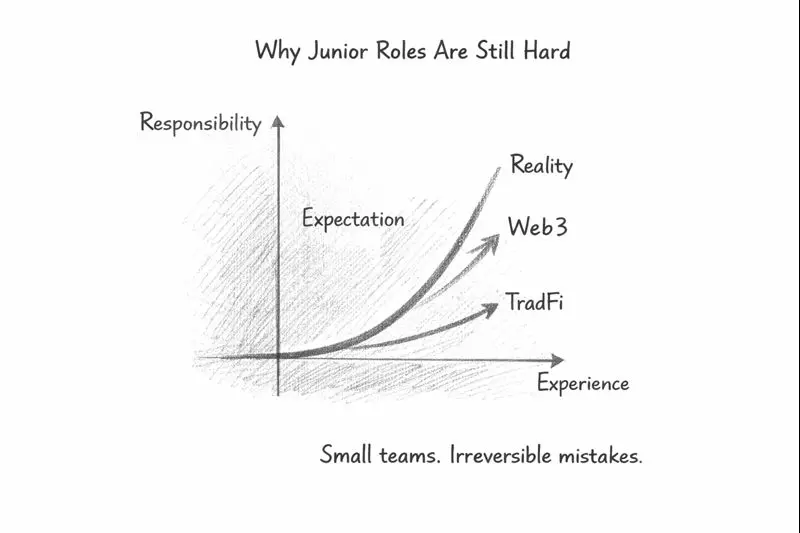
Entry Paths That Actually Work
1. AML / TradFi → Web3 Compliance
The most reliable route. Works best when candidates add blockchain context to existing judgment.
2. Risk / Audit / Ops → Compliance
Common in infra and foundation teams. Requires closing the gap between traditional systems and blockchain — especially bridging knowledge gaps across blockchain platforms.
3. Tech-Adjacent → Compliance
Harder, but viable for engineers or QA professionals with security or incident exposure.
What Hiring Managers Expect
They test:
Reasoning under ambiguity
Escalation judgment
Documentation clarity
Business awareness
Compliance teams hire risk translators, not rule readers.
Long-Term Career Outlook
Compliance roles:
Survive market cycles
Gain importance as regulation matures
Offer leadership paths beyond IC roles
But this is not a shortcut into Web3. It rewards patience and clarity, not hype.
Several professionals who entered compliance expecting a quieter alternative to technical roles later discovered that the pressure simply shifts — from building systems to defending decisions under scrutiny.
More Web3 career navigation discussions:
https://artofblockchain.club/discussion/job-search-web3-career-navigation-hub
https://artofblockchain.club/discussion/interview-prep-hub-non-developer-web3-roles
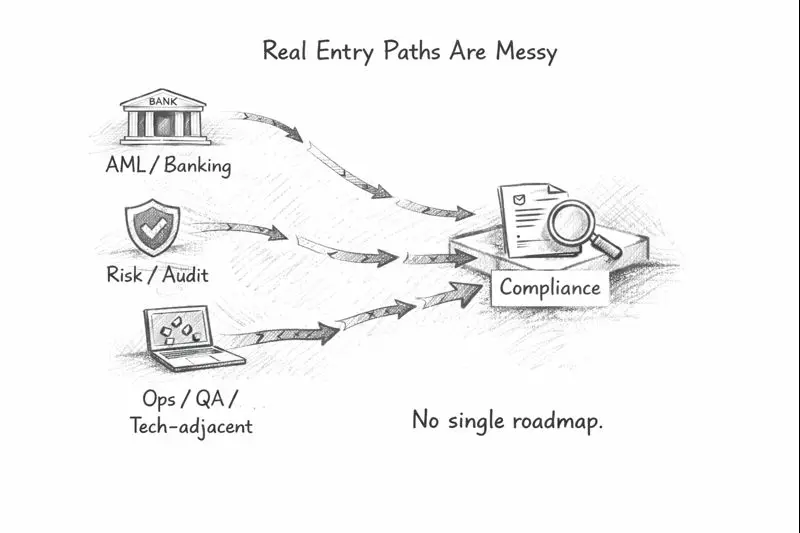
FAQs
1. Is blockchain compliance a good career in 2025–2026?
Yes — for professionals who value stability, judgment, and long-term relevance.
2. Do I need a law degree?
No. Most hires do not have law degrees.
3. Can non-technical professionals enter?
Yes. Many come from finance, risk, or ops and navigate via Web3 career navigation discussions.
4. Are roles remote?
Many are, though senior regulator-facing roles may require location presence.
5. Is blockchain compliance future-proof?
No career is future-proof, but compliance roles age better than most Web3 roles.
Final Thoughts
This landscape continues to evolve. Expectations in 2026 already differ from what most guides published in 2024 suggested — and they are still shifting as regulation, enforcement, and product design collide.
Blockchain compliance is not glamorous. It’s demanding, judgment-heavy, and unforgiving.
But for the right profile, it’s one of the most resilient and underrated Web3 career paths.
If you value clarity over hype, this field is worth serious consideration.
For ongoing learning, exposure to real cases, and perspective from peers, engaging with real Web3 career discussions is where theory turns into employability.
